Life
This Online Sobriety School Wants To Help People Change Their Relationship With Drinking

When Holly Glenn Whitaker decided she wanted to quit drinking in 2012, she was presented with two options: a 12-step program, or rehab. She tells Bustle that because she doesn't identify as an alcoholic, 12-step programs didn't appeal to her. When she learned that rehab, which wasn't covered by her health insurance, would cost between $15,000 and $85,000 for one month, she quickly eliminated that as an option, too. Because she couldn't find anything that addressed her specific needs, Whitaker decided to build something new. She founded Hip Sobriety, which has evolved into Tempest, an online recovery school geared toward people who want to change their relationship with alcohol.
"When I started this seven years ago, I didn’t know one person [who was trying to stop drinking] who didn’t use AA. I think we have these binaries of alcoholic versus non-alcoholic, and we’re only really supposed to stop drinking when we’re alcoholics, when we’re a specific type of drinker," Whitaker says.
You don't have to identify as an alcoholic, as someone who has alcohol use disorder (AUD), or hit "rock bottom" to use Tempest. "Our services are meant for anyone who has an uncomfortable relationship with alcohol. We’ve lowered the barrier to start talking about how alcohol is showing up in your life," Whitaker tells Bustle.
A study published in the Journal of Substance Abuse Treatment confirms that this program is on to something. The study found that other mutual help programs are just as effective as 12-step groups for people who want to stop drinking. This means that there is evidence to suggest that AA is not the only way, as is further detailed in an in-depth exploration of the the topic in Pacific Standard magazine.
For those who want to try another approach, Tempest offers an affordable, eight-week digital program that's focused on delivering individualized care to support each student's unique recovery journey. The course, which is open for sign up, will comprise a new lecture every week, deliver guided meditations, a weekly Q&A with Whitaker, personal attention from dedicated subject-matter experts, and offer an inclusive online and in-person community. The course costs $797 for the full eight weeks, which is a little less than $100 a week, though Whitaker tells Bustle that scholarship opportunities are available for "underserved and disproportionately affected populations."
Tempest also acknowledges that people have different communication styles. This is why they offer modes of communication and forms of community that appeal to both introverts and extroverts so everyone can feel comfortable during their recovery. There are also meetings that address the challenges of specific groups like parents or the LGBTQ community. And the best part is, just showing up and participating is considered success.
"The reason people are successful here is because we measure every single tiny step people take as success. We don’t measure it as how sober are you, we are constantly reaffirming to the participants of the program that their success is showing up even when they don’t want to," Whitaker says.
Tempest works by helping people reimagine their relationships with both alcohol and themselves by breaking the process down into small, manageable steps. "Change is not made through extreme, painful, white-knuckle approaches. That’s not sustainable. Change is made over time," the Tempest Sobriety School course page explains.
Whether you identify as someone with AUD, or you simply feel that alcohol is holding you back from being your best self, Tempest offers tools to help participants learn the importance of purpose, meaning, and creativity in living a life without alcohol. It also encourages its students to celebrate small victories as big wins.
"Success is facing things that you're terrified of. Success is opening an email, or repeating a mantra, or trying meditation for the first time. Reaffirming that you’re inherently worthy, and reinforcing that it’s not measured in number of days. It’s also not taken away from you if you relapse. We have a very supportive approach, and we measure success in people’s engagement. It’s not a zero sum game," Whitaker says.
And while the program is for anyone who wants to change their relationship with alcohol, people participating in 12-step or other recovery programs can use it as a part of their recovery process if they feel like they need more support.
It's important to note that what's good for one person isn't good for every person. Everyone should do what works for them. But for someone who hasn't found that yet, or who feels intimidated about asking for help because they think their use of alcohol is a "serious problem," Tempest is looking to make starting that journey a little easier.
Editor's Note: If you or someone you know is seeking help for substance use, call the SAMHSA National Helpline at 1-800-662-HELP (4357).